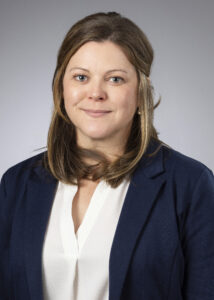Sustainability Officer
 Mindy Granley, sustainability officer, Duluth
Mindy Granley, sustainability officer, Duluth
Why she shows up: It’s inspiring that my role gets to be involved in decision-making across the city. It’s my job to inspire people to think about sustainability and the environment and find ways to get that work done. That’s really exciting to me. It’s the balance between the environment, our economy, and the social needs of our community – I love all three of those things. I want everyone to be successful, I want there to be great jobs, I want us to preserve our environment, and I want to give everyone equal access to all the great things Duluth has to offer.
How she got the job (and how you could too): A high school friend’s mom worked for the city, and I always admired her. I knew I wanted to be a scientist and didn’t think scientists worked for cities, but his mom did all this important work and made things happen. She was an inspiring person, so it did put an idea in my head to know somebody who worked for the city.
Leaving high school, I knew I was really good at math and science, and I wanted to be a scientist. I have a science degree in geology and hydrogeology. I also earned a Master of Science degree, and it was during my thesis work that I realized I wanted to translate science to help people make good decisions based on science.
I knew I was a scientist, but not the kind that worked in a lab. I wanted to be able to inform decisions and work alongside people. I had a series of jobs that helped me do that and hone that skill, so when this job with the City of Duluth opened, I thought this was the job for me.
Working in sustainability, you need to be a good partner and listener. You need to love talking to people –all the time. You have to be able to relate to folks and meet them where they are and understand their limitations and budget concerns.
Change management is the skill that I would emphasize. That’s not a skill you learn through getting a degree, but it’s learned through getting experience and getting things done. I think too often we’re in our technical specialties, but sometimes you just need someone who knows how to create partnerships, communicate, manage projects, and simply move things forward. You need to be a good activator, communicator, listener, and learner. You also need to have some technical background – in energy, water, waste reduction, climate, buildings- but change management skill is critical too.
What’s the job like? There’s not really a typical day, but it’s a lot of meetings, a lot of learning, a lot of webinars, a lot of phone calls, a lot of communication. I also write and edit a lot of proposals, pitches, grant applications, and communications pieces for our website. If you’re not sharing what you’re doing or learning with others, you’re not doing it right. I work closely with our communications department, trying to tell our sustainability stories.
I’m currently working to implement three Department of Energy award projects: solar planning, geothermal district energy, and creating an energy blueprint for an environmental justice community. So, project coordination and management is an everyday activity too. I’m writing a fourth energy-related grant with a community partner right now to focus on commercial buildings and industry! Another example of a future project priority is Street Maintenance. Street Maintenance equipment renewal is one of my priorities right now because I see that some of our stuff is old and aged, and not reliable. We can do it better – we can get equipment that covers more ground, is more efficient, is quieter, is reliable, and has fewer air quality issues!
Advice she has for those interested in pursuing a career in sustainability or cities hoping to create sustainability teams: Sustainability is about infrastructure, buildings, streets, stormwater, wastewater, and energy — all of it! Sometimes cities are just missing that person who has a little bit of capacity and time and energy to flow across departments and look for priorities or chase down projects and partnerships to move forward. I think that’s what sustainability staff can do; it’s really about innovation. All the ingredients are there for the chemical reaction, but the sustainability officer can be your catalyst!
You should thrive on change and innovation too, if you join a sustainability team. If you’re someone who’s usually saying, “Well we’ve always done it this way,” then think twice! To make progress, we need people willing to try new things, do things differently, and seek new solutions. Try to be innovative, flexible, listen, and use sustainability as a way to de-silo the City’s various departments. In the end, progress in sustainability almost always comes down to those relationships and the trust you build between departments and organizations.
Are you interested in learning more about a city career? One great way to get advice is to contact someone in your own city or a city nearby. You can ask questions about the job and learn more about training programs that may be available. Connect to city websites and city contact information through the League of Minnesota Cities.
